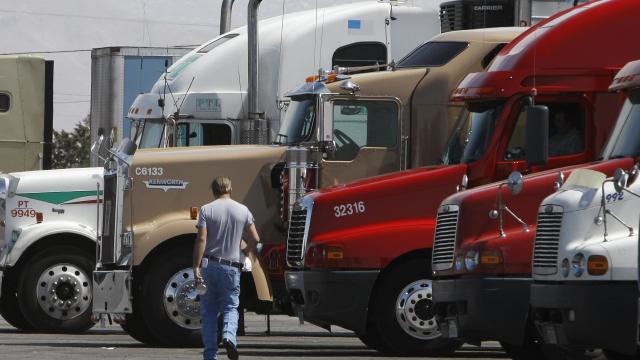In California, trucks won’t be able to pollute the air and planet for much longer. The state is approving the nation’s first-of-its-kind rule for truck manufacturers on Thursday. The goal? To make more electric trucks.
The California Air Resources Board is set to approve the proposal to make zero-emission trucks a reality. The rule would require that auto manufacturers increase the proportion of zero-emission trucks in their sales to California from 2024 to 2035. By 2035, the state wants 55 per cent of the sales from light- and medium-duty trucks to be electric. As for heavier trucks, manufacturers need to clean up 75 per cent of their sales by 2035. The state first began efforts to pass the Advanced Clean Trucks Regulation in 2016 under former Gov. Jerry Brown.
“California has always been a leader in advancing clean transportation technology,” Costa Samaras, an associate professor of civil and environmental engineering at Carnegie Mellon University, told Earther. “It’s a huge deal.”
[referenced url=”https://gizmodo.com.au/2020/06/west-coast-states-are-teaming-up-to-build-an-electric-highway/” thumb=”https://gizmodo.com.au/wp-content/uploads/2020/06/19/poc0c0abjbajq1ymmjwy-300×169.jpg” title=”U.S. States Are Teaming Up to Build an Electric Highway” excerpt=”America’s West Coast is preparing for a future where giant diesel transport trucks go electric. Utilities and state agencies in California, Oregon, and Washington announced a plan to transform highway infrastructure that would speed the transition.”]
Most of California’s greenhouse gas emissions come from transportation of which heavy-duty vehicles make up more than 8 per cent of those emissions. Passenger vehicles are the largest contributor, but these vehicles also include light- and medium-duty trucks, which are regulated under the new rule. Common light-duty trucks are pick-ups such as the Chevrolet Silverado. Medium-duty trucks include vehicles used to transport goods, such as delivery trucks or school buses.
The rule also follows a plan announced last week to electrify highway infrastructure for freight transport in California, Oregon, and Washington. If all these trucks are going to run on batteries, they’ll need adequate charging stations to help them get around. As part of this major electrification plan, California is telling carmakers that they need to build more clean trucks. Their dirty ones will no longer be welcome for sale in the state.
The rule should help make a huge dent in the state’s greenhouse gas emissions as well as air quality. The state is home to some of the deemed diesel engine exhaust to be carcinogenic in 2012. So this rule will not only help save the planet; it’ll literally save lives.
“The reduction and eventual elimination of diesel emissions near where people live is an equity issue. It’s an environmental justice issue,” Samaras said. “These pollutants, they cause real health damages. And lots of times, it has been communities of colour who have borne the brunt of these types of emissions. Electrifying all segments of transportation and having a very clear electric grid are two issues that we can’t wait on any longer.”
Samaras expects the California rule will kickstart the market and increase demand for these clean trucks in other states. Tesla’s electric semi-truck is only the beginning. After all, carmakers don’t want to make one type of vehicle for one state and a different type elsewhere. This just might be the pressure the market needs to finally electrify vehicles of all sizes.
